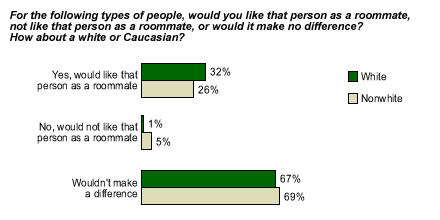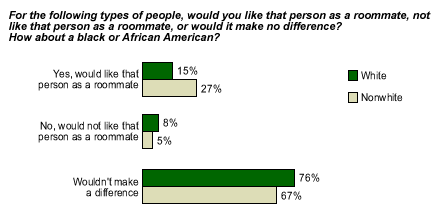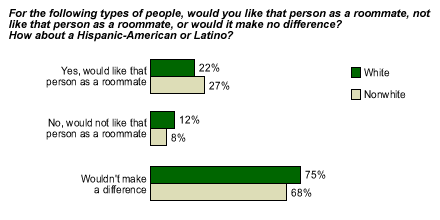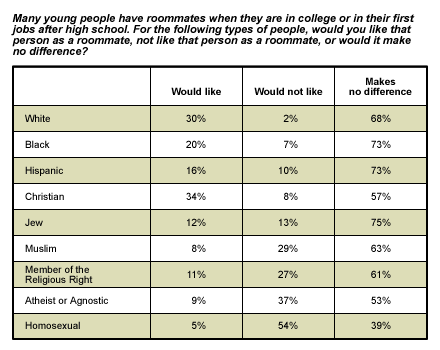For the past few decades, mainstream American society has made at least an outward show of demonizing prejudice. Americans have created anti-racism campaigns, passed hate-speech laws, shunned egregious offenders, and made "multiculturalism" a household word. Many have worked hard to instill our kids with the value of accepting people of different beliefs, races, and religions.
But is that message sinking in on a practical level? Though they may accept respect for others as a value, would today's younger generation live it? Earlier this year, the Gallup Youth Survey* asked 13- to 17-year-olds the following question: "Many young people have roommates when they are in college or in their first jobs after high school. For the following types of people, would you like that person as a roommate, not like that person as a roommate, or would it make no difference?" The question was followed by a list of different groups of people -- "white or Caucasian," "black or African American," "Hispanic-American or Latino," "Christian," "member of the religious right," "Jew," "Muslim," "atheist or agnostic," or "homosexual." The results indicate that today's teens are quite accepting -- to a point.
Racial Differences
For the most part, race and ethnicity don't much matter when it comes to roommates. When asked if they would like a white roommate, 30% of teens said they would, 2% said they wouldn't, and 68% said it would make no difference to them. Twenty percent said they would like a black roommate, 7% said they wouldn't, and 73% said it would make no difference. Sixteen percent said they would like a Hispanic roommate, 10% said they wouldn't, and 73% said it wouldn't make a difference.
Breaking the results down by race of respondent provides additional insight. The majority of whites and nonwhites alike say it wouldn't make a difference to them if they had a roommate of another racial or ethnic group. Very few say they would dislike a roommate of another racial or ethnic group. For example, 8% of whites said they would not like a black roommate, and 12% would not like a Hispanic roommate. Five percent of nonwhites would not like a white roommate. For the most part, teens' tolerance levels hold up well under the racial and ethnic crosscheck on this question.



Religious Differences
When it comes to religion, the responses show more variance, though a majority said it would not make a difference if the roommate came from any of several religious persuasions. Teens would be least comfortable with a roommate who was an atheist (37%), followed by a Muslim (29%), member of the religious right (27%), Jew (13%), or Christian (8%).

The only type of roommate a majority of American teens would not like to be paired with is a homosexual. Five percent would like a homosexual roommate, 54% wouldn't, and 39% say it wouldn't make a difference. It is unclear if the results are due to the nature of the situation being assessed (i.e., teens may feel uncomfortable living in close quarters with someone they think might be attracted to them) than to tolerance per se. But for whatever reasons, teens would be least comfortable sharing an apartment or dorm room with a homosexual.
Bottom Line
Today's kids show real promise of being "tolerant" adults. As kids grow up and begin to know people of other races, religions, and sexual orientations, it's possible that their lingering prejudices will fade. As Al Winseman, Gallup's Faith Community Practice Leader, said, "My view (and I'm by nature an optimist), is that there is far less negativity than one might anticipate, and that the multicultural world kids see and live in is making inroads into their personal lives as well -- once they get their first taste of being out on their own."
*The Gallup Youth Survey is conducted via an Internet methodology provided by Knowledge Networks, using an online research panel that is designed to be representative of the entire U.S. population. The current questionnaire was completed by 1,200 respondents, aged 13 to 17, between Jan. 23-Feb. 10, 2003. For results based on the total sample, one can say with 95% confidence that the maximum margin of sampling error is ±3%. For a complete description of the sampling and weighting procedures used to conduct the survey, click here.
